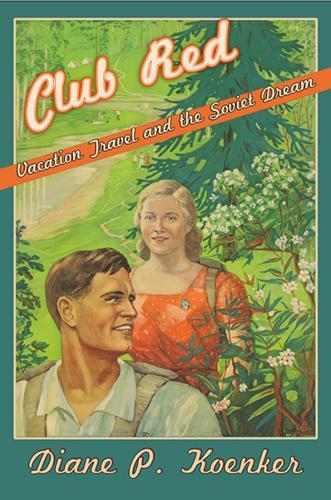Overview
The Bolsheviks took power in Russia 1917 armed with an ideology centered on the power of the worker. From the beginning, however, Soviet leaders also realized the need for rest and leisure within the new proletarian society and over subsequent decades struggled to reconcile the concept of leisure with the doctrine of communism, addressing such fundamental concerns as what the purpose of leisure should be in a workers' state and how socialist vacations should differ from those enjoyed by the capitalist bourgeoisie. In Club Red, Diane P. Koenker offers a sweeping and insightful history of Soviet vacationing and tourism from the Revolution through perestroika. She shows that from the outset, the regime insisted that the value of tourism and vacation time was strictly utilitarian. Throughout the 1920s and '30s, the emphasis was on providing the workers access to the ""repair shops"" of the nation's sanatoria or to the invigorating journeys by foot, bicycle, skis, or horseback that were the stuff of ""proletarian tourism."" Both the sedentary vacation and tourism were part of the regime's effort to transform the poor and often illiterate citizenry into new Soviet men and women. Koenker emphasizes a distinctive blend of purpose and pleasure in Soviet vacation policy and practice and explores a fundamental paradox: a state committed to the idea of the collective found itself promoting a vacation policy that increasingly encouraged and then had to respond to individual autonomy and selfhood. The history of Soviet tourism and vacations tells a story of freely chosen mobility that was enabled and subsidized by the state. While Koenker focuses primarily on Soviet domestic vacation travel, she also notes the decisive impact of travel abroad (mostly to other socialist countries), which shaped new worldviews, created new consumer desires, and transformed Soviet vacation practices.
Full Product Details
Author: Diane P. Koenker
Publisher: Cornell University Press
Imprint: Cornell University Press
Dimensions:
Width: 15.50cm
, Height: 2.50cm
, Length: 23.50cm
Weight: 0.907kg
ISBN: 9780801451539
ISBN 10: 0801451531
Pages: 328
Publication Date: 24 April 2013
Recommended Age: From 18 years
Audience:
College/higher education
,
Postgraduate, Research & Scholarly
Replaced By: 9781501710674
Format: Hardback
Publisher's Status: Active
Availability: Manufactured on demand

We will order this item for you from a manufactured on demand supplier.
Language: English
Reviews
<p> From the recuperative rest homes of the 1920s to the 'wild' tourism of the 1970s, vacationing in the Soviet Union was meaningful business. In this exemplary piece of research, Diane P. Koenker shows how much the nonproductive side of life has to tell us about all aspects of the Soviet experience. -Stephen Lovell, King's College London, author of Summerfolk: A History of the Dacha, 1710-2000
<p> Club Red's scope is impressive; Diane P. Koenker covers tourism and vacations from the Soviet Union's beginnings to its dissolution. In so doing, she describes how tourism and vacations both reflected and contributed to the transformation of Soviet society from a spartan and productivist proletarianism to the Soviet version of the 'good life.' Because Koenker situations Soviet vacations and tourism within the broader history of the role of consumerism and tourism in modern societies, Club Red's appeal will extend well beyond scholars and students of Soviet history. -Shelley Baranowski, Distinguished Professor of History, The University of Akron, author of Strength through Joy: Consumerism and Mass Tourism in the Third Reich
Author Information
Diane P. Koenker is Professor of History at the University of Illinois at Urbana-Champaign. She is the author of Republic of Labor: Russian Printers and Soviet Socialism, 1918-1930 and Club Red: Vacation Travel and the Soviet Dream, and is the coeditor of Turizm: The Russian and East European Tourist under Capitalism and Socialism, all from Cornell.




